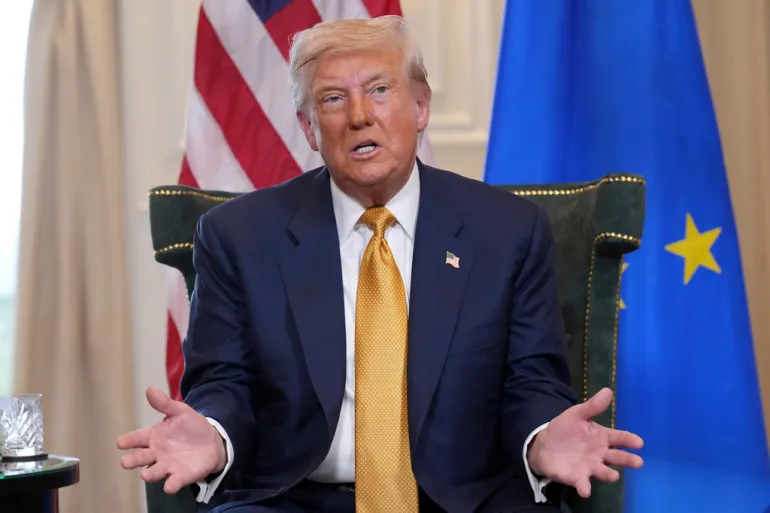In a bold and unexpected move, former U.S. President Donald Trump has issued a new 10 to 12-day deadline for Russia to end the war in Ukraine. Speaking at a high-profile event, Trump emphasized that the ongoing war is unacceptable and promised swift diplomatic action if he returns to the White House. This statement has caught global attention and sparked discussions among world leaders, defense experts, and citizens alike.
With the Russia-Ukraine conflict now stretching over three years, Trump’s sudden declaration has introduced a new layer of urgency. The war has caused widespread destruction, a humanitarian crisis, and a global economic downturn. But can a self-imposed deadline change the course of this complex conflict?
Let’s break down what Trump said, how it’s being received, and what this could mean for the future of the Russia-Ukraine war.
Trump’s Bold Promise: “I Will End It in 10 to 12 Days”
At a recent rally in Ohio, Donald Trump told supporters that he could end the war in Ukraine within 10 to 12 days if elected again. He didn’t provide detailed steps or explain what pressure or diplomacy he would use. However, his message was loud and clear:
“If I were president, the war in Ukraine would never have happened. And if I go back in, I’ll end it in less than two weeks. I guarantee it.”
This strong statement is consistent with Trump’s previous claims that he could negotiate peace swiftly with both Russian President Vladimir Putin and Ukrainian President Volodymyr Zelenskyy. Still, critics argue that he is oversimplifying a war filled with historical tensions, military escalations, and global interests.
Trump Deadline for Russia Ukraine War Explained
To understand Trump’s deadline for the Russia Ukraine war, we must consider the complex situation on the ground. The war, which began in February 2022, has led to:
- Over 500,000 deaths and injuries (military and civilian combined)
- Millions of Ukrainians displaced from their homes
- Ongoing missile strikes, land disputes, and economic sanctions
- A global energy and food supply crisis
Trump’s promise suggests a backdoor negotiation or pressure tactic that has yet to be seen from any current world leader. Supporters argue that Trump’s rapport with Putin could help open diplomatic channels closed to others. Critics, however, say such a quick fix could mean compromising on Ukraine’s sovereignty or ignoring NATO’s stance.
How World Leaders Reacted
President Zelenskyy’s Response
President Volodymyr Zelenskyy has previously expressed skepticism about Trump’s past claims of being able to end the war. After the recent statement, a spokesperson from his office commented:
“Ukraine seeks peace but not at the cost of its freedom or territorial integrity. Any peace talks must respect our sovereignty.”
Zelenskyy’s team is concerned that Trump’s version of “peace” might include freezing the conflict or giving up occupied territories—something Ukraine has repeatedly rejected.
Putin Remains Silent
The Kremlin has not issued an official response yet. However, Russian media is closely watching Trump’s campaign trail. Some political analysts believe Putin might welcome a Trump presidency due to his more isolationist and anti-NATO rhetoric in the past.
European Union and NATO Members
Leaders in the EU and NATO have reacted cautiously. Many fear that Trump’s return could change the balance of support for Ukraine. A senior EU diplomat told Reuters:
“A peace deal imposed too quickly or without Ukraine’s full agreement could weaken trust in NATO’s long-term unity.”
What Would a 10-Day Peace Plan Look Like?
Trump hasn’t shared an official plan, but experts believe the following options could be considered:
1. Immediate Ceasefire Talks
He could call for an immediate ceasefire between both nations and bring them to a neutral table—possibly in Switzerland or Turkey.
2. Sanctions Leverage
Trump might threaten to lift or enforce new sanctions on Russia to push for a faster settlement.
3. NATO Re-Alignment
He may use the U.S. role in NATO to push allies toward a diplomatic solution rather than continued military support.
4. Territorial Compromise
Though controversial, one possibility is that Trump could push for Ukraine to recognize some Russian-occupied regions in exchange for peace—something Ukraine opposes.
5. Direct Diplomacy with Putin
Trump’s personal communication with Vladimir Putin could play a role in these talks. He has often boasted about their past interactions, which he claims were “respectful and effective.”
Domestic Reactions in the U.S.

Trump’s statement has stirred political debate at home, especially with the 2024 presidential election heating up.
Republican Supporters Applaud
Many of Trump’s supporters welcomed the move, calling it strong leadership and saying the Biden administration has failed to prevent global conflict.
Democrats Raise Concerns
Democrats argue that Trump’s comments are dangerous and naive. They believe any agreement made without coordination with allies could damage U.S. credibility.
“You can’t just walk into a 3-year war and fix it with a handshake,” said Sen. Chris Murphy, a member of the Senate Foreign Relations Committee.
The Risks of a Forced Deadline
Setting a short deadline like 10 to 12 days may look bold, but it comes with risks:
- Unrealistic Expectations: Peace processes typically take months or years. Russia and Ukraine have tried negotiations before, with little long-term success.
- Weakened Alliances: Rushing peace could upset NATO allies who support Ukraine’s fight against aggression.
- Moral Compromise: A quick deal might mean sacrificing human rights, justice, and long-term stability in Eastern Europe.
Will the Trump Deadline for Russia Ukraine War Succeed?
Whether Trump’s deadline for the Russia Ukraine war can bring real results depends on many unknowns. Even if elected, Trump would not take office until January 2025. That means at least six more months of war under the current leadership.
Still, his announcement could shift political momentum and force the current U.S. administration to reconsider its strategy. Biden has focused on long-term military and economic support for Ukraine. Trump’s proposal, in contrast, promises a short and sharp peace strategy.
What Experts Are Saying
Military Analysts
- Lt. Gen. Mark Hertling (Ret.): “Ending this war in 10 days is not realistic unless major concessions are made. That could backfire badly.”
- Evelyn Farkas, former Deputy Assistant Secretary of Defense: “If this is just campaign talk, it’s dangerous. If it’s serious, it needs more clarity.”
Diplomacy Experts
- Dr. Fiona Hill, former White House Russia expert: “Trump may believe he can broker a deal because of past ties with Putin. But diplomacy needs more than just bold words.”
What Happens Next?
Here’s what to watch in the coming days:
- More details from Trump: Will he release a detailed peace plan or just keep repeating bold claims?
- Reactions from Moscow and Kyiv: Will Putin or Zelenskyy respond officially?
- Impact on the 2024 election: Will Trump’s foreign policy become a major campaign issue?
Final Thoughts
Trump’s 10 to 12-day deadline to end the Russia-Ukraine war has added a dramatic twist to the already tense global situation. While his supporters see it as a sign of strength, critics fear it could lead to a rushed, unfair deal that may only pause the violence temporarily.
The world is watching closely. In a conflict where every day brings more suffering, the hope for peace is always welcome—but how we get there matters just as much.
Read Next – First Amendment in Trump’s WSJ Lawsuit: What You Need to Know






